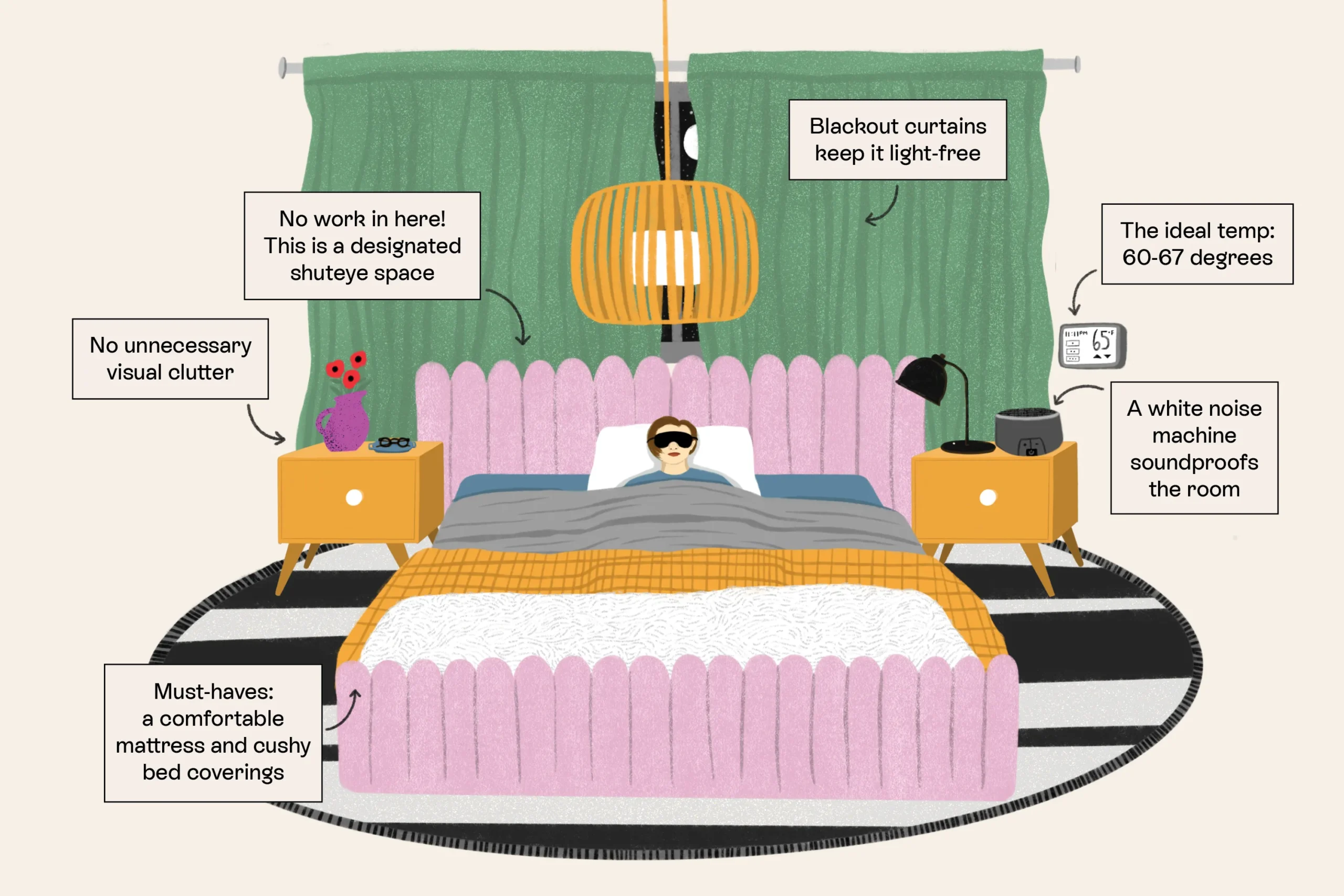When stress creeps into your evenings, it can make bedtime feel like a battleground rather than a peaceful retreat. Maybe you’ve experienced that too: tossing and turning, unable to drift off, while worries spin in your head like an endless loop. The good news is, there are many effective ways to reduce stress before bedtime that can help you achieve the deep, restful sleep you deserve. This guide will walk you through practical techniques and introduce you to tools that many people use to relax and unwind before heading off to sleep. Let’s begin.
1. Create a Relaxing Evening Routine
One of the best things you can do for yourself is to develop a bedtime routine that signals your body it’s time to wind down. It’s not just about turning off the lights—it’s about nurturing habits that will help reduce stress and promote relaxation. Think of your bedtime routine as a gift you give to yourself. A consistent ritual every night can teach your brain to let go of the day’s stress and prepare for a restful sleep.
Consider starting your evening with a warm bath or shower. The warm water helps relax your muscles and washes away the stress of the day. You might want to add some Epsom salts—they’re rich in magnesium, which is known for its calming properties. Dr Teal’s Epsom Salt Soaking Solution is a highly rated product on Amazon that many people love to use as part of their relaxation ritual.
Another aspect of your routine can be herbal tea. Chamomile is a classic choice known for its calming properties. Brands like Celestial Seasonings Sleepytime Tea are both affordable and loved by many for their gentle, soothing effect. Avoid caffeinated drinks during the evening hours, as they can trigger stress and make it difficult to fall asleep.
2. Try Mindfulness Meditation and Breathing Exercises
Mindfulness meditation can be one of the most effective ways to ease your mind before bedtime. When you meditate, you focus on the present moment, which helps let go of anxiety about the past or the future—common culprits of bedtime stress. You don’t have to be an experienced yogi to enjoy the benefits of meditation. All it takes is 10-15 minutes of sitting quietly and focusing on your breathing.
For breathing exercises, try the 4-7-8 breathing technique. Breathe in through your nose for 4 seconds, hold it for 7 seconds, and then exhale slowly through your mouth for 8 seconds. This breathing pattern signals your nervous system to calm down, helping your mind and body prepare for sleep. If you’re new to meditation, consider using an app like Calm or Headspace to guide you through it.
You might also find comfort in aromatherapy, which can be a powerful addition to your bedtime routine. A diffuser with essential oils like Lavender or Ylang-Ylang can help signal your brain to relax. The InnoGear Essential Oil Diffuser, available on Amazon, is a highly-rated choice that works beautifully for this purpose.
3. Keep Electronics Out of the Bedroom
You’ve probably heard it before, but it bears repeating: electronic devices are notorious for disturbing sleep. The blue light emitted from screens reduces the production of melatonin—the hormone that controls your sleep-wake cycle. To reduce stress before bedtime, keep your phone, tablet, or laptop out of reach. Instead of scrolling on your phone, replace this habit with a healthier alternative.
You could try reading a book—an actual printed book—to relax your mind. If you enjoy having options at your fingertips, a Kindle Paperwhite might be a good option, as its screen doesn’t emit the same kind of light that would disturb your sleep. Instead of getting sucked into social media or emails, enjoy stories that take your mind off your daily worries.
4. Journal Your Thoughts
One of the reasons why you may feel stressed at bedtime is because your mind is filled with unresolved thoughts. Whether it’s tomorrow’s to-do list, a worry about a work project, or personal matters, having these thoughts circling in your head can make falling asleep difficult.
Journaling is a great way to declutter your mind. By writing down your worries and thoughts, you’re effectively putting them aside for the night. Keep a journal by your bed, and spend 5-10 minutes writing down whatever is on your mind. A gratitude journal can also help shift your focus to positive aspects of your life, reducing stress before bed.
Consider The Five Minute Journal, a product that’s designed to help you express gratitude and reflect on the positive moments of your day. It’s highly rated and popular among people looking to cultivate more positive habits in their daily lives.
5. Try Gentle Yoga or Stretching
Physical tension can often be a source of stress, making it harder to unwind at night. Gentle stretching or yoga can be a powerful tool in combating bedtime stress. Yoga helps release physical tension, while also encouraging mental relaxation. Even a short 10-minute session of gentle poses like Child’s Pose, Legs Up the Wall, or Cat-Cow can help loosen your muscles and calm your mind.
If you’re new to yoga or need guidance, there are plenty of online resources or YouTube videos available that focus on bedtime yoga routines. Alternatively, using a yoga mat that provides support, like the Gaiam Essentials Thick Yoga Mat, can make a big difference in your practice. The mat is highly rated for comfort, especially if you’re working on hard surfaces.
6. Control Your Sleep Environment
Creating a bedroom environment that promotes sleep is crucial. Your sleep space should be comfortable, cool, and quiet. If outside noises disturb you, consider using a white noise machine to create a more peaceful environment. The LectroFan High Fidelity White Noise Machine is a popular and highly rated product that many find useful for drowning out background noise.
The temperature of your room is also important. Keeping the room slightly cool (between 60-67 degrees Fahrenheit) has been found to be ideal for sleep. Weighted blankets can also be helpful in reducing stress and promoting relaxation by giving you a feeling of comfort and security. The YnM Weighted Blanket is a well-loved option on Amazon that’s specifically designed to help people feel calm and relaxed before sleep.
Consider investing in comfortable bedding as well. High-quality sheets and pillows can make a difference in how well you sleep. The Beckham Hotel Collection Gel Pillow is a favorite among many, known for its soft yet supportive comfort.
7. Avoid Stressful Content Before Bed
Be mindful of what kind of content you consume in the evening. Watching or reading news that is distressing can make it harder for your mind to relax before sleep. Instead, switch to something lighter. Consider watching a feel-good movie, reading an uplifting book, or listening to a podcast focused on relaxation or storytelling. Some people find listening to sleep stories incredibly calming, which are available on apps like Calm.
Music can also help you relax. Consider creating a playlist of calming music that soothes you. Classical, ambient, or instrumental music can create a peaceful environment that encourages sleep. The SleepPhones Wireless Headband, which you can find on Amazon, is a comfortable way to listen to music or sleep sounds while lying down.
8. Use Herbal Supplements to Support Relaxation
There are herbal supplements that can help promote relaxation and reduce bedtime stress. Melatonin is a popular sleep aid that many people use to support their natural sleep-wake cycle. Brands like Natrol Melatonin have high ratings on Amazon and are commonly used to help ease into sleep. However, always consult with your doctor before trying any new supplement to ensure it’s safe for you.
Ashwagandha is another supplement known for its stress-relieving properties. It’s an adaptogen that can help your body better manage stress. Nature’s Way Ashwagandha is a highly rated product that could help you ease into a more relaxed state before bedtime.
9. Practice Progressive Muscle Relaxation (PMR)
Progressive Muscle Relaxation (PMR) is a technique that involves tensing and then relaxing each muscle group in your body. It helps you release physical tension and can be very effective for reducing stress before bed. Start by lying down and slowly work through each part of your body—tense your toes for a few seconds, then release, move to your calves, thighs, and so on until you’ve worked your way up to your shoulders and neck.
This practice not only helps relax your body but also keeps your mind focused, preventing it from drifting into stressful thoughts. It’s a simple but effective way to connect your body and mind in preparation for sleep.
10. Limit Stimulants and Late-Night Eating
Reducing your intake of stimulants like caffeine and nicotine is crucial if you want to lower your stress levels before bedtime. Try to avoid caffeine after mid-afternoon—it can stay in your system for hours, making it harder to fall asleep. If you’re a tea drinker, switch to decaffeinated options or herbal teas in the evening.
Late-night snacking can also interfere with your sleep. Eating heavy meals late at night can cause discomfort and digestive issues that keep you awake. If you’re hungry, consider having a light snack that promotes sleep, like a banana or a handful of almonds. Both are natural sources of melatonin and magnesium, which can help your body relax.
11. Practice Visualization Techniques
Visualization is a powerful technique for reducing stress. Picture yourself in a calming environment—maybe you’re on a beach, feeling the warm sun on your skin and hearing the waves lap at the shore. Close your eyes and use your imagination to transport yourself to that place. The more details you can envision, the more effective the visualization will be in reducing your stress and calming your mind before bed.
This practice helps shift your focus from anxious thoughts to peaceful imagery, making it easier to relax and fall asleep. You can even find guided visualization recordings on platforms like YouTube or Spotify to help guide you through the process if it’s difficult to do on your own.
12. Set Boundaries with Work and Stressors
Finally, setting boundaries with work and other stressors is crucial for your peace of mind. If possible, avoid checking your work emails or messages after a certain time in the evening. It’s important to separate your work life from your personal life to give your brain time to switch off and relax. Consider setting an alarm an hour before bedtime to remind yourself to begin winding down and disconnect from anything that might be causing stress.
Try to create a dedicated space for relaxation in your home—maybe a reading nook or a cozy chair where you can enjoy some quiet time. Setting these boundaries signals to your body and mind that it’s time to let go of the day’s worries and focus on relaxation.
Conclusion
Reducing stress before bedtime takes practice, but with the right habits and tools, it can be done. The key is to create a routine that works for you—one that signals your mind and body that it’s time to let go of stress and prepare for rest. Try incorporating some of the techniques discussed above, such as meditation, journaling, gentle yoga, or using a weighted blanket.
Remember, the goal is to transform your bedtime into a calming ritual, something you look forward to rather than dread. By investing in yourself and adopting these habits, you can reduce stress and enjoy restful, rejuvenating sleep. Sweet dreams await—are you ready to create the nighttime routine that brings them to life?




